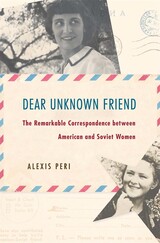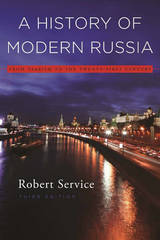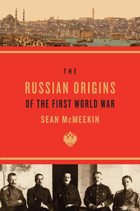
In the tense years of the early Cold War, American and Soviet women conducted a remarkable pen-pal correspondence that enabled them to see each other as friends rather than enemies.
In a compelling new perspective on the early Cold War, prizewinning historian Alexis Peri explores correspondence between American and Soviet women begun in the last years of World War II and continuing into the 1950s. Previously unexamined, the women’s letters movingly demonstrate the power of the personal, as the pen pals engaged in a “diplomacy of the heart” that led them to question why their countries were so divided.
Both Soviet and American women faced a patriarchal backlash after World War II that marginalized them professionally and politically. The pen pals discussed common challenges they faced, such as unequal pay and the difficulties of balancing motherhood with a career. Each side evinced curiosity about the other’s world, asking questions about family and marriage, work conditions, educational opportunities, and religion. The women advocated peace and cooperation but at times disagreed strongly over social and economic issues, such as racial segregation in the United States and mandatory labor in the Soviet Union. At first both governments saw no risk in the communications, as women were presumed to have little influence and no knowledge of state secrets, but eventually Cold War paranoia set in. Amid the Red Scare, the House Un-American Activities Committee even accused some of the American women of being communist agents.
A rare and poignant tale, Dear Unknown Friend offers a glimpse of the Cold War through the perspectives of women who tried to move beyond the label of “enemy” and understand, even befriend, people across increasingly bitter political divides.



The catastrophe of the First World War, and the destruction, revolution, and enduring hostilities it wrought, make the issue of its origins a perennial puzzle. Since World War II, Germany has been viewed as the primary culprit. Now, in a major reinterpretation of the conflict, Sean McMeekin rejects the standard notions of the war’s beginning as either a Germano-Austrian preemptive strike or a “tragedy of miscalculation.” Instead, he proposes that the key to the outbreak of violence lies in St. Petersburg.
It was Russian statesmen who unleashed the war through conscious policy decisions based on imperial ambitions in the Near East. Unlike their civilian counterparts in Berlin, who would have preferred to localize the Austro-Serbian conflict, Russian leaders desired a more general war so long as British participation was assured. The war of 1914 was launched at a propitious moment for harnessing the might of Britain and France to neutralize the German threat to Russia’s goal: partitioning the Ottoman Empire to ensure control of the Straits between the Black Sea and the Mediterranean.
Nearly a century has passed since the guns fell silent on the western front. But in the lands of the former Ottoman Empire, World War I smolders still. Sunnis and Shiites, Arabs and Jews, and other regional antagonists continue fighting over the last scraps of the Ottoman inheritance. As we seek to make sense of these conflicts, McMeekin’s powerful exposé of Russia’s aims in the First World War will illuminate our understanding of the twentieth century.
READERS
Browse our collection.
PUBLISHERS
See BiblioVault's publisher services.
STUDENT SERVICES
Files for college accessibility offices.
UChicago Accessibility Resources
home | accessibility | search | about | contact us
BiblioVault ® 2001 - 2024
The University of Chicago Press









